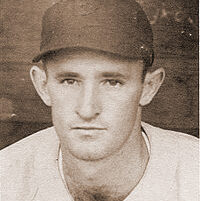
1972 BASEBALL INDUCTEE
LARRY
POWELL
Some baseball players can last twenty years in the game and never play for a championship team. Larry Powell was on the roster of seven pennant winners in a five-year span. “Makes for a good trivia question and I actually heard one radio announcer in the Bay Area ask, ‘What baseball pitcher was on three pennant winners in the same year?'” Powell said with a grin. “My best pitching years were in the armed forces, but that was the problem some great ball players faced, too.” Powell was born July 19, 1914 on a ranch between Reedley and Dinuba. The Powell family farmed mostly raisin grapes. Powell, a left-hander, developed an unusual way of forging a smooth pitching motion. “By my senior year in high school, I was 5’10” and weighed 145 pounds soaking wet, so when the others were playing basketball, I was throwing a football. I did that most of the year and I developed an easy pitching motion that was easy on my arm.” He didn’t get the opportunity to pitch until his senior year. Coach Jack Savory taught Powell how to throw a screwball and that was his best pitch. Control came with hard work throwing back and forth to his brothers. In 1932, he helped his team to win the league title, but was beaten 13-0 in the semifinals of the valley playoffs against Roosevelt High.
When Powell turned twenty-one, he put on fifteen pounds and his throwing velocity improved. He also had more confidence and pitched so well against Sanger in 1935 that he was asked to play on their team for the following season. “We ended up winning the so-called valley League which consisted of teams from Sanger, Reedley, Selma, Kerman, and Lemoore.” Sanger played the San Francisco Seals of the Pacific Coast League in an exhibition. Powell said he got beat up a little, but San Francisco manager Lefty O’Doul liked the way he threw. Art Ramage was manager of the Fresno Tigers, but also a Seals scout, so he signed Powell. Powell went to spring training in Hanford, but before he had a chance to pitch, he got a call from Uncle Sam and ended up in the Army. Powell was asked to list the three choices of service that he would like. Field artillery was only his third choice, but that was what he got and reported to Fort Sill, Oklahoma. That’s where politics took over. The bad news was he flunked out. The good news was Colonel Whiteside noted on his record that he was a baseball player. Powell was sent to Colonel Turner to be assigned to a team, but added that the 18th artillery group was the best. “So I ended up pitching for them. We wound up winning the championship and I pitched a beautiful game in the final game, beating the team that had won each year before,Powell said. “I won two games in the five-game playoff.” It was only later that Powell learned that Colonel Turner had bet on the 18th.
Following discharge, he joined the Red Sox and the strange pennant situation began. He was a week with the Red Sox and they ended up winning the American League. He was sent to the Seals and they assigned him to Salt Lake City. They both won pennants. Powell said he pitched a few good games, but had lost the motion and struggled. “I was thirty-eight at the time and just pitching terrible. So I sat down and tried to figure out what I was doing before when I was winning. The Seals released me and I pitched for both Fresno and Visalia in the California League. For some reason, I started to come around.” Powell pitched for the Los Angeles Angels the next spring, but they sent him back to Visalia. Then he got a call from Des Moines, lowa where the team was battling for the pennant. Powell shut out Denver in his first start, beat them again, and captured the pennant. The following year, he pitched in Yakima, Washington and regained his form. He was 16-7 and the team won the pennant, repeating the following year. Powell passed away in May 2008.




